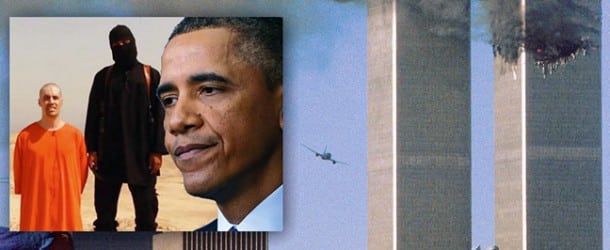The current debate over how to label the enemy in our so-called “war on terror” reminded me of a column I wrote for Lagniappe one week after the 9/11 attack. I asked the editor to dig it up for me, and what follows is pretty much verbatim what I wrote at that time.
From the Sept. 20, 2001 edition of Lagniappe Magazine:
I, along with the rest of America, was horrified last Tuesday morning when I turned on the TV and watched hijackers deliberately crash commercial airliners in the twin towers of the World Trade Center. I was horrified, but not surprised.
Over the past 20 years, Islamic extremists acting under an umbrella organization known as al-Qaida have launched numerous terrorist attacks around the world, and the group’s founder, Osama bin Laden, has repeatedly called for a holy war against the United States, vowing that American blood will flow. Yet America slept.
The basic problem is the unwillingness of our political leaders to acknowledge that Western civilization is under attack by radical Islamic fundamentalists. Get out your map and connect the dots: Bosnia, Kosovo, Macedonia, Chechnya, Dagistan, Uzbekistan, Afghanistan and Kashmir. All around the fringes of Islam, guerrilla wars are being waged, yet the U.S. has dealt with these as if they were unrelated events with unique solutions.
This ad-hoc policy has not always placed us on the right side of the conflict. For example, we backed the KLA in Kosovo, despite its terrorist tactics and links to bin Laden, and we condemned Russia when it invaded Chechnya to root out Islamic terrorists, trained by bin Laden, who blew up a series of apartment buildings in Moscow.
Our foreign policy has been built on the notion that, following the downfall of communism, we were going to establish a “new world order,” based on Western principles of secular democracy, free trade, multiculturalism and equal rights for all. Those who advocate this policy assume that, deep down, all people share the same values. But that is not true. Islamic fundamentalists see the spread of Western values as an assault upon their culture and religion, and extremists such as bin Laden seek to purge these influences from their sacred lands.
To understand why those planes were flown into the World Trade Center, one must understand two things about the perpetrators. First, what prompted bin Laden to declare war on the U.S. was not the Arab/Israeli conflict, but the stationing of U.S. troops on the Arabian Peninsula, land he considers sacred; and, second, Islamic fundamentalists see the nation-state based on secular law as a Western concept designed to minimize the influence of religion on society. Al-Qaida’s goal is to overthrow secular governments in the Muslim world, and eventually abolish national boundaries [creating an Islamic caliphate].
The attack on 9/11 was aimed as much at the leaders of secular states in the Muslim world as it was at the United States. By killing innocent people in a most horrible way, the attackers hope to goad the U.S. into reacting in a manner the Muslim masses will perceive as an attack on Islam itself. If that happens, it will enhance the stature of the Islamic fundamentalists, and undermine the tenuous support for secular pro-western leaders, potentially leading to their overthrow.
We must walk a fine line when we define the enemy in this war. We must not create the perception that we are waging war against Islam, but limiting our focus could be equally dangerous. Bin Laden is not “the enemy”; if he were eliminated tomorrow, another extremist would quickly step into his shoes.
In World War II, we fought two wars: one in Europe, and one in Asia. In Europe, we defined the enemy as Adolph Hitler, the Nazis, and fascism in general, but not the people of Germany and Italy. In Asia, we fought “the Japs” — the Japanese leaders and their political ideology were little known to the general public in America.
Our war against terrorism must follow the European model. We must clearly identify the leaders and belief structure we seek to eradicate, and not allow this to turn into a war against Arabs and Muslims. Unfortunately, our muddled foreign policy, and the refusal to connect the dots and recognize the danger of militant Islamic fundamentalism, make it difficult for us to do this.
Again, I wrote this nearly 14 years ago, when George W. Bush was the president, and, subsequently, I was an outspoken opponent of our invasion of Iraq. But mistakes of the past cannot be undone. Whether we like it or not, the reality today is that we are at war against radical Islam, and the enemy is growing stronger as we continue to refuse to acknowledge or define “the enemy.”
Lt. General Michael Flynn, former director of the Defense Intelligence Agency, recently blasted President Obama’s foreign policy, saying: “They want us to think that our challenge is dealing with an undefined set of violent extremists, or merely lone-wolf actors with no ideology or network. But that’s just not the straight truth.”
Of the president’s refusal to use terms such as “Islamic terrorists” or “Islamic radicals,” Flynn went on to say: “you cannot defeat an enemy you do not admit exists.”
But, just as important as defining the enemy is defining victory. If victory means imposing secular democracy, Western culture and Christian morality throughout the world, then we are in for a long war against Islam. If we define victory as defeating Islamic radicals who want to resurrect the Ottoman Empire, opress people in the name of a Medieval interpretation of sharia law, and destroy the West, we will have a focused war, one more like our war against Nazi Germany, and we are likely to find allies among the modern Muslim nations.
















Comments are closed.